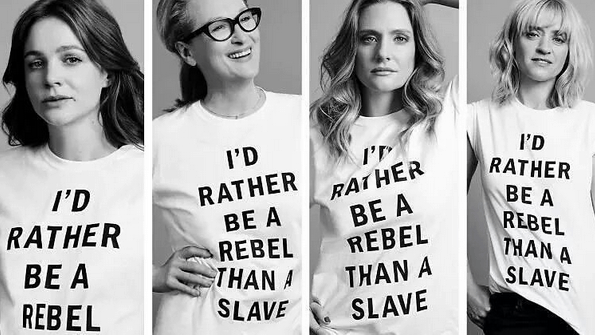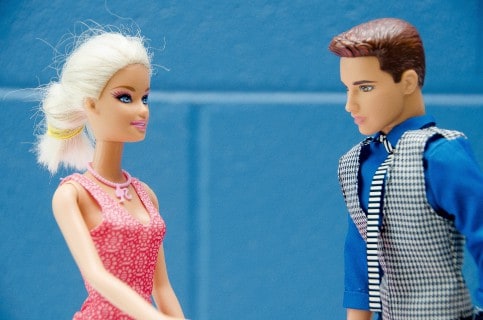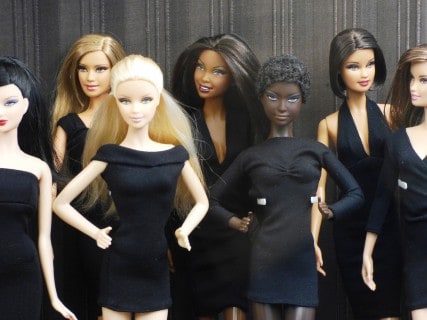Meryl Streep is Afraid of the F-Word, but You Shouldn’t Be

“I’m a humanist.”
Depending on your social circles (and social networks), you may have heard someone say that they’re not a feminist, they’re a humanist. A self-declared “humanist” is reluctant to associate themselves with feminists because they, unlike feminists, are the ones who want equality. Humanists don’t think women are better than men, nor do they believe women should have more power than men in order to make up for injustices. As actress Meryl Streep puts it, humanists strive for a “nice, easy balance” among genders. Between donning a controversial, culturally insensitive t-shirt and denouncing feminism, Streep has become yet another female celeb to bring the f-word into the spotlight…and toss it to the side.
Say it with me, everyone: “feminism!”
Was that so bad? Meryl Streep denying she’s a feminist is nothing new. Evangeline Lilly and Shailene Woodley, both of whom play fictional women oft referred to as strong female characters, have shied away from identifying as feminists; Lilly associates feminists with women who “pretend to be men,” and Woodley “loves men,” so obviously she can’t be a feminist. Even Beyoncé, known for sampling author Chimimanda Ngozi Adichie’s reading of “We Should All Be Feminists,” once hesitated at identifying as a feminist.
Meryl Streep’s rejection of the word is a little ironic, considering how she’s outspokenly supported what we’d all consider to be feminist issues and criticized the disparity within her industry. In her Time Out London interview, Streep cites Malala Yousafzai as an inspiration. At London’s Women in the World event, she ardently asserted that the fight for equality isn’t over and women and men have to participate.
So if she talks like a feminist and acts like a feminist, is she a feminist?
Yes and no—let’s talk about it. I’m going to go ahead and say that, for all intents and purposes, Meryl Streep is basically a feminist. After facing criticism for her comments, she’s since stated that her actions speak louder than her words. Given that she’s outwardly supported some common feminist issues, I’ll say that her actions have said enough.
But do you know which action has me skeptical? Those surrounding Streep’s starring role in the upcoming movie Suffragette. In the film, she portrays real-life suffragette Emmeline Pankhurst, who is credited with the following quote:
Know that women, once convinced that they are doing what is right, that their rebellion is just, will go on, no matter what the difficulties, no matter what the dangers, so long as there is a woman alive to hold up the flag of rebellion. I would rather be a rebel than a slave.
When Streep and her co-stars wore t-shirts with the bolded snippet of the shirt for a UK photo shoot, many Americans were pissed. Taking our history into consideration, the juxtaposition of the word “rebel” and “slave” was enough to incense the Internet. Looking at our own women’s suffrage movement, which only sought the white woman’s right to vote, the inevitably racialized word is given a deeper meaning. The added context of the actual quote and the women’s suffrage movement that Pankhurst belonged to adds an entirely new (yet not entirely different) layer to the issue.
Meryl Streep isn’t my type of feminist, but she’s a perfect fit for her new role.
Suffragette chronicles the movement for British women’s right to vote, which was earned in 1918, and later amended to become more (age) inclusive in 1928. I’ll be honest—growing up in the United States meant that my education revolved around our own story of suffrage, and I know very little about the fight for the vote across the pond.I do know that our movement excluded Black women, enforcing the wait-your-turn sentiment that seems to echo throughout the story of civil rights. And I know that when I saw promotions for Suffragette, I’d easily mistaken the film for a retelling of American history, due to yet another case of whitewashing.
I’m not saying that the UK is without prejudice, but the picture of British women’s suffrage is a lot less white than ours. White American suffragettes wanted to keep Black women out of the mainstream movement because they believed including women of color would hinder their own chances of gaining the vote. After excluding Black women from their marches and spotlight, the white suffragettes wouldn’t speak on behalf of their concerns. Compare this to the British suffrage movement, where it wasn’t uncommon to see Indian women marching with white British suffragettes–and some white women even fought for the rights of Indian women. This contrast of inclusivity can’t be recognized without acknowledging the differing viewpoints towards national identity; India was still a part of the British empire during the British suffrage movement, and while racism is certainly present within imperialism, the sentiment of citizenship in British society varied from that within American culture, where race (and color) is a primary focal point.
The diversity among the British fight for the vote could’ve been a prime opportunity for creating an accurate representation of history by featuring the nonwhite women who made their mark. But where is Princess Sophia Duleep Singh in Suffragette? Didn’t the princess campaign for British women’s suffrage, as well as the rights of Indian women? Indian women like Sarojini Naidu, Herabai Tata and Mithibai Tata fought for suffrage too—but I didn’t see them represented in any photo shoots or promotions for the film.
Sarah Gavron directed Suffragette, which opens in U.S. theaters October 26th. At the aforementioned Women in the World conference, Gavron discussed how difficult it was to find actors interested in the male roles, as the parts weren’t “big enough.” The crowd got a kick out of Gavron’s statement. Now the men are having a hard time finding a good role! How the tables have turned! Meanwhile, only 1% of the top 500 films featured a nonwhite female protagonist, only one of the six films was a live-action film, and people of color spoke for less than 10 minutes in the entire Harry Potter film franchise. It is worth saying that all women are subject to love-interest parts, supporting roles and stupid interview questions about their clothes or their diet.
However, it is also worth noting that women of color have even fewer on-screen opportunities. Many roles are silent and employ nonwhite women as living, breathing pieces of scenery. Others have little opportunity outside of playing a maid, nanny, or another undeveloped, uniformed worker. Gavon had the chance to include the trailblazing Princess Singh or the mother-daughter team of Herabai and Mithibai Tata. She made the deliberate choice to exclude them entirely. Omitting these women, whether intentional or not, is a political choice that follows a longstanding tradition in feminism: the stories and issues of the white majority take precedence over minorities.
Ain’t I a feminist?
Although Suffragette doesn’t tell our story of women’s suffrage, one that didn’t truly end until the ‘60s (or later, if you want to open that can of worms), it will be released in our theaters and will spark a discussion about our own feminist history. Hell, all we’ve seen is a couple of photos and I’m already going in on it. Some will watch the film and feel inspired, others may be disappointed. The British women of Suffragette may remind us of our own suffragettes, such as Elizabeth Cady Stanton, who didn’t want Black men to vote or Black women like Ida B. Wells to march with them.
If the film was remade from a U.S. perspective, would the director incorporate Wells? Would she include the fact that Wells and her Black suffragette club wanted to march in the 1913 Washington suffrage parade–and was asked to walk at the back of the line? Just as the scope of the suffrage movement in Suffragette is focused on white women, Meryl Streep seems to represent the white-centric version of feminism.
If you want to speak about wage inequality, bring light to the fact that Black and Latina women earn even less than their white sisters. When discussing the lack of female representation in the film industry, highlight the unrealized voices of women of color within the field. And when stating that men need to play a role in feminism, realize that as a more privileged woman, you have a part to play as well. You can start by apologizing for that awful shirt. (Featured image via sixbrownchicks)
Last modified on November 9th, 2016






Show Comments +